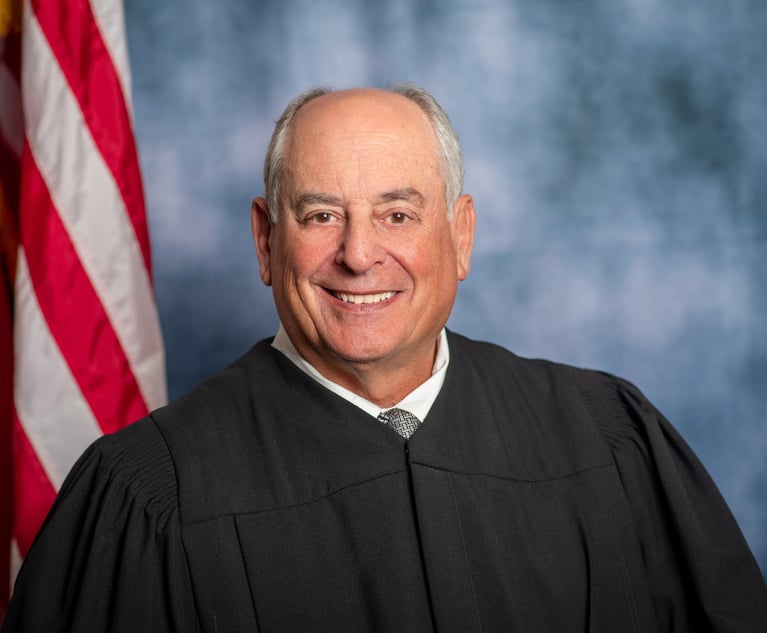 Georgia first lady Marty Kemp (left) and Gov. Brian Kemp during a hospitality industry human trafficking awareness training. (Photo: Governor Brian Kemp/Twitter)
Georgia first lady Marty Kemp (left) and Gov. Brian Kemp during a hospitality industry human trafficking awareness training. (Photo: Governor Brian Kemp/Twitter)Kemps to Back Tougher Anti-Human Trafficking Laws
"Traveling across our state, I have talked to many survivors," Marty Kemp said in a joint news release with her husband. "I have assured them that Georgia is listening to them, and now - through this legislation - we are finally giving them a voice."
January 22, 2020 at 02:25 PM
3 minute read
Gov. Brian Kemp and first lady Marty Kemp—who have both actively campaigned for tougher enforcement against all kinds of human trafficking—have outlined legislation they plan to back this year directed at that cause.
The Kemps said Wednesday they plan to work with Georgians for Refuge, Action, Compassion, and Education (GRACE) Commission members and legislators focusing on three key legislative measures to combat human trafficking during the 2020 legislative session.
"Traveling across our state, I have talked to many survivors," Marty Kemp said in a joint news release with her husband. "I have assured them that Georgia is listening to them, and now—through this legislation—we are finally giving them a voice."
"This legislation is a true testament to Marty's commitment to dismantle this criminal industry for good," Brian Kemp said in the news release. "By seeking justice for victims and holding bad actors accountable, we are sending a strong message that human trafficking has no place in Georgia."
The Kemps said legislation will be announced in the coming days to accomplish three goals:
- Create new pathways for record restriction for survivors;
- Close loopholes in sex offender registry and improper sexual contact code; and
- Permanently revoke commercial driver's licenses for those convicted of using commercial vehicles to traffic in labor or sexual servitude.
The Kemps said the legislation was developed in close coordination with the organization Rescuing Hope and its executive director Susan Norris, along with members of the GRACE Commission.
Last year, anti-human trafficking legislation (H.B. 281) boosted penalties for pimping and pandering, making them felony offenses upon the second conviction, the Kemps noted. Under current law, keeping a place of prostitution, pimping and pandering also are felonies if the victim is younger than 18.
However, they said, Georgia's sex offender registry code was never changed to require registration for any of those three offenses. In addition, a felony conviction for burglary with intent to rape was not listed as a conviction requiring registration as a sex offender. Under the expected legislation, those felony convictions will require registration.
The Kemps said law enforcement has requested closing a loophole in the "custodial sexual contact" code by adding the offenses of improper sexual contact by a foster parent. The legislation will seek to broaden those offenses to include improper sexual contact between a teacher and student through 12th grade. The legislation also is expected to include law enforcement officers and those in their custody, as well as hospital employees and patients.
The driver's license ban is worded to match a federal rule passed this past summer through the U.S. Department of Transportation, the Kemps said. The new legislation will allow the Georgia Department of Driver's Services to revoke a person's commercial driver's license and permanently disqualify him or her from driving a commercial motor vehicle if he or she is convicted of trafficking an individual for labor servitude or sexual servitude in violation of O.C.G.A. 16-5-46 and used the commercial motor vehicle to commit the offense.
This content has been archived. It is available through our partners, LexisNexis® and Bloomberg Law.
To view this content, please continue to their sites.
Not a Lexis Subscriber?
Subscribe Now
Not a Bloomberg Law Subscriber?
Subscribe Now
NOT FOR REPRINT
© 2024 ALM Global, LLC, All Rights Reserved. Request academic re-use from www.copyright.com. All other uses, submit a request to [email protected]. For more information visit Asset & Logo Licensing.
You Might Like
View All
Georgia Supreme Court Honoring Troutman Pepper Partner, Former Chief Justice
2 minute read
'A 58-Year-Old Engine That Needs an Overhaul': Judge Wants Traffic Law Amended
3 minute read
Appeals Court Removes Fulton DA From Georgia Election Case Against Trump, Others
6 minute read
Family of 'Cop City' Activist Killed by Ga. Troopers Files Federal Lawsuit
5 minute readTrending Stories
- 1'Largest Retail Data Breach in History'? Hot Topic and Affiliated Brands Sued for Alleged Failure to Prevent Data Breach Linked to Snowflake Software
- 2Former President of New York State Bar, and the New York Bar Foundation, Dies As He Entered 70th Year as Attorney
- 3Legal Advocates in Uproar Upon Release of Footage Showing CO's Beat Black Inmate Before His Death
- 4Longtime Baker & Hostetler Partner, Former White House Counsel David Rivkin Dies at 68
- 5Court System Seeks Public Comment on E-Filing for Annual Report
Who Got The Work
Michael G. Bongiorno, Andrew Scott Dulberg and Elizabeth E. Driscoll from Wilmer Cutler Pickering Hale and Dorr have stepped in to represent Symbotic Inc., an A.I.-enabled technology platform that focuses on increasing supply chain efficiency, and other defendants in a pending shareholder derivative lawsuit. The case, filed Oct. 2 in Massachusetts District Court by the Brown Law Firm on behalf of Stephen Austen, accuses certain officers and directors of misleading investors in regard to Symbotic's potential for margin growth by failing to disclose that the company was not equipped to timely deploy its systems or manage expenses through project delays. The case, assigned to U.S. District Judge Nathaniel M. Gorton, is 1:24-cv-12522, Austen v. Cohen et al.
Who Got The Work
Edmund Polubinski and Marie Killmond of Davis Polk & Wardwell have entered appearances for data platform software development company MongoDB and other defendants in a pending shareholder derivative lawsuit. The action, filed Oct. 7 in New York Southern District Court by the Brown Law Firm, accuses the company's directors and/or officers of falsely expressing confidence in the company’s restructuring of its sales incentive plan and downplaying the severity of decreases in its upfront commitments. The case is 1:24-cv-07594, Roy v. Ittycheria et al.
Who Got The Work
Amy O. Bruchs and Kurt F. Ellison of Michael Best & Friedrich have entered appearances for Epic Systems Corp. in a pending employment discrimination lawsuit. The suit was filed Sept. 7 in Wisconsin Western District Court by Levine Eisberner LLC and Siri & Glimstad on behalf of a project manager who claims that he was wrongfully terminated after applying for a religious exemption to the defendant's COVID-19 vaccine mandate. The case, assigned to U.S. Magistrate Judge Anita Marie Boor, is 3:24-cv-00630, Secker, Nathan v. Epic Systems Corporation.
Who Got The Work
David X. Sullivan, Thomas J. Finn and Gregory A. Hall from McCarter & English have entered appearances for Sunrun Installation Services in a pending civil rights lawsuit. The complaint was filed Sept. 4 in Connecticut District Court by attorney Robert M. Berke on behalf of former employee George Edward Steins, who was arrested and charged with employing an unregistered home improvement salesperson. The complaint alleges that had Sunrun informed the Connecticut Department of Consumer Protection that the plaintiff's employment had ended in 2017 and that he no longer held Sunrun's home improvement contractor license, he would not have been hit with charges, which were dismissed in May 2024. The case, assigned to U.S. District Judge Jeffrey A. Meyer, is 3:24-cv-01423, Steins v. Sunrun, Inc. et al.
Who Got The Work
Greenberg Traurig shareholder Joshua L. Raskin has entered an appearance for boohoo.com UK Ltd. in a pending patent infringement lawsuit. The suit, filed Sept. 3 in Texas Eastern District Court by Rozier Hardt McDonough on behalf of Alto Dynamics, asserts five patents related to an online shopping platform. The case, assigned to U.S. District Judge Rodney Gilstrap, is 2:24-cv-00719, Alto Dynamics, LLC v. boohoo.com UK Limited.
Featured Firms
Law Offices of Gary Martin Hays & Associates, P.C.
(470) 294-1674
Law Offices of Mark E. Salomone
(857) 444-6468
Smith & Hassler
(713) 739-1250






